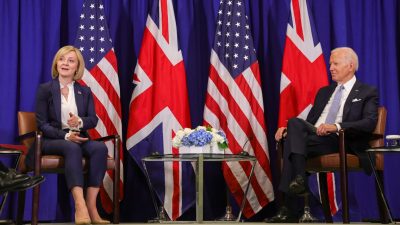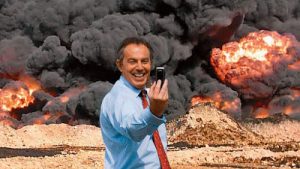Is the Once Biggest Imperial Power Now Fast Losing Its Independence in Foreign Policy?

All Global Research articles can be read in 51 languages by activating the Translate Website button below the author’s name (only available in desktop version).
To receive Global Research’s Daily Newsletter (selected articles), click here.
Click the share button above to email/forward this article to your friends and colleagues. Follow us on Instagram and Twitter and subscribe to our Telegram Channel. Feel free to repost and share widely Global Research articles.
Global Research Fundraising: Stop the Pentagon’s Ides of March
***
Britain was the biggest imperial power for well over a century. During its heyday it used to control about a quarter of the global landmass. So vast was this empire that there was always sunlight on one part or the other of this vast territory, leading to the boast that the sun never sets on the British Empire.
In more recent times, however, an important talking point relates to whether Britain is fast losing the independence of its foreign policy, as this gets increasingly linked too closely to the priorities of the world’s most dominant power the USA.
Recently one of the world’s most quoted authorities on international relations, Prof. John Meirsheimer of the University of Chicago, USA, said in an interview with the New Statesman (Weekend Interview, February 10, 2024)—
“The British will do almost anything the Americans want them to do. The Americans often find that their allies don’t always want to go along with their various schemes. But there’s one exception to that—Britain. This did not used to be the case. The Americans desperately wanted the British to join the fight in Vietnam, but the British declined. But I think if we were to have a Vietnam today, and the American government were to ask the British to get involved, they would enthusiastically jump into the fight.”
Further, Prof Meirsheimer questioned the wisdom of this policy. He stated,
“Such loyalty does not make good strategic sense. Especially if you look at the withering away of the British military. It is not like the British military power is growing; it seems to be heading in the other direction. And in that situation you would expect the British to cut back on their commitments to these various escapades that the Americans involve them in. But that’s not happening. Quite the contrary.”
In an article ‘Global Britain is becoming a stooge of the USA’ (Conversation, September 27, 2021), Victoria Honeyman, Associate Professor of British Policy, University of Leeds, has written,
“The USA has always been able to shout ‘jump’ and the UK ask ‘how high’ but the public humilation which goes with that does not fit well with the post-Brexit rhetoric of a strong, ‘global’ Britain.”
Image: “Photo Op”. Credit: Imperial War Museum/Peter Kennard & Cat Philips (2005)
In fact a quick search of the discourse on US-UK relations of recent times would reveal that words like ‘stooge’ and ‘poodle’ have been used quite frequently to capture the subservient role of what was earlier the biggest imperial power. This was particularly highlighted at the time of the lackey-like loyalty displayed by Tony Blair in his highly unethical and opportunist support for the entirely false reasons being mentioned by the US to justify the invasion of Iraq. This is when the words ‘Bush’s poodle’ or simply ‘poodle’ were widely used for Tony Blair. In the musical video accompanying George Michael’s song ‘Shoot the Dog’, which was quite high on the popularity charts at that time, George W. Bush throws a ball for the dog to fetch. Instead Blair fetches the ball. After Blair a few rather weak efforts were made to correct the balance somewhat, but these did not have any durable impact. Then things worsened again with Boris Johnson being a very enthusiastic stooge and rushing to Ukraine to do the Empire’s bidding of sabotaging a peace accord between Ukraine and Russia which was close to bearing fruit.
Such a relationship would not have been so objectionable if the USA was in the same phase not adopting an irrationally and excessively aggressive foreign policy resulting in enormous destruction in many parts of the world. According to widely cited Brown University’s estimates on costs of the USA’s war on terror during (approximately) the first two decades of this century, nearly 900,000 people died directly in this and if indirect costs are also included, then as many as 4.5 million perished. Whether in Afghanistan or Iraq, Libya or Syria or elsewhere, Britain was most often the most willing collaborator of the USA in all this avoidable destruction.
Hence ethically and in a moral sense, this excessive loyalty has been a disaster for Britain as it has led to one massive destruction after another which was entirely avoidable and entirely unjustified. However even in a strategic sense, it makes little sense for the UK to keep getting involved in more and more wars and making more and more enemies.
What I saw while reporting on violence in a slum may be related here to reveal the dangers inherent in the present role assumed by Britain. Most of the violence in this slum was being caused by a dominant person who can best be described as a slumlord of sorts. To maintain his grip over the slum he often took with him a person, whom local people referred to as ‘chuutbhaiya’ (smaller collaborator), from door to door while imposing his diktats by beating any dissenting person. However something happened which forced the slumlord to relocate to his rural base. Now his smaller collaborator was left alone in a vulnerable position. The people now gathered together and beat him up so badly that he had to run away. This explains the high risks a smaller collaborator incurs when making more and more enemies at the behest of big brother whose protection may not always be available.
Britain was involved in the plunder and exploitation of many countries and regions during the colonial times. Even while leaving it created mischief due to which there is repeated outbreak of conflict in Palestine, in the Indian sub-continent and elsewhere.
Hence it would be much better for Britain to try to make up for this now by essentially becoming a country of peace and justice. Unfortunately it has chosen a path which is exactly the opposite of this. It is very disruptive towards world peace, and in addition it brings entirely avoidable dangers to Britain. In the context of Ukraine, Britain during the last decade 2014-24 has been consistently involved in highly provocative activities with the USA and NATO allies. At the same time, the economic and social problems of the common people of Britain have been increasing, particularly the bottom 33% of the population.
Hence Britain should seriously think of changing its priorities so that the people of Britain can be at peace with themselves and with the entire world. Its historically most beneficial role can be to try its best to take the USA too in the same direction, using its close cultural and other links at various levels with the USA.
*
Note to readers: Please click the share button above. Follow us on Instagram and Twitter and subscribe to our Telegram Channel. Feel free to repost and share widely Global Research articles.
Bharat Dogra is Honorary Convener, Campaign to Save Earth Now. His recent books include Planet in Peril, Protecting Earth for Children, A Day in 2071 and Man over Machine. He is a regular contributor to Global Research.
Featured image: UK Prime Minister Liz Truss meets with US President Joe Biden in New York City on September 21, 2022 (Photo credit: No 10 Downing Street)


